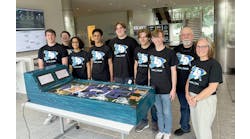Industry/education partnership allows Connected Systems Institute success
Rockwell Automation, Cisco, Microsoft and Heartland Business Systems partnered to help the University of Wisconsin-Milwaukee (UWM) in 2017 to develop a program that better prepares the manufacturing workforce for the future, accelerate innovation by bringing industry and academic researchers together, and facilitate digital transformation for small- and medium-sized manufacturers. They’ve recently released results from their partnership.
In order to achieve this objective, they created the Connected System Institute (CSI), which helps to develop manufacturing domain specialists through education, state-of-the-art labs and collaborative research opportunities. It also helps to address the shortage of trained workers by providing the technology knowledge needed for next-generation manufacturing and offers a state-of-the-art facility that allows members to run technology demonstrations and proofs of concepts.
In addition to industry partners, CSI brings together UWM’s schools of business, information sciences and engineering to drive adoption of advanced manufacturing methods and technologies. The intention is that all work done at CSI should be sustainable and repeatable at its core. UWM is home to faculty who have extensive expertise in Industrial Internet of Things (IIoT)-related disciplines, giving CSI a reservoir of talent experienced in using digital tools to accelerate innovation. This capability enables the institute to drive economic growth by supporting the development of innovative production solutions and by filling the pipeline with digital manufacturing specialists.
CSI is a center of excellence for a global practitioner community that is transforming manufacturing processes. The institute brings together industry and academia to deliver education and research opportunities focused on the needs of advanced manufacturing and on facilitating the evolution of the IIoT. Investing in a more connected production environment requires a significant culture change that affects how employees think about their work and how they are rewarded. CSI provides a community forum for learning more about these changes.
Industry partnerships
Industry partnerships are integral to the work at CSI. With the support of its partners, the institute is helping academicians and students become more knowledgeable multidisciplinary collaborators. The institute launched in November 2017 with an initial investment from Rockwell Automation and it has been able to leverage global insights and expertise from Cisco’s Country Digital Acceleration Program, which has more than 1000 projects in 40 countries aimed at powering secure and sustainable digitization through cross-vertical solutions. Partnerships and co-innovative environments such as these, in turn, help CSI develop new business processes based on current and emerging technologies. Strategic insights will help Industry partners make their own production environments and processes more effective. With 75 billion devices expected to be connected to the Internet by 2025, the work at CSI has the potential to transform how products are designed, produced, and sold. The connected systems models that CSI is developing can help manufacturers extract more business insights from the huge volume of data flowing in from IIoT devices and networks. Ultimately, the institute will help its industry partners determine the mix of connected IIoT systems that will yield the best return on investment.
R&D focus
Research at CSI focuses on a broad range of advanced technologies, including:
- Digital twins: Digital representations of advanced manufacturing systems that enable real-time simulation and analysis of sensor data from production processes.
- Data and sensor networks: The study of data and sensor networks used for cloud-based analytics.
- Data analytics: Platforms that ingest data from sensors and IIoT networks to measure key performance indicators (KPIs).
- Machine learning integration: Creation of machine learning algorithms to improve KPIs in industrial systems.
- OT cybersecurity: Research aimed at developing techniques that identify and address security weaknesses and vulnerabilities in production systems.
- ERP integration: Design of a tri-directional link among the manufacturing lab environment, SAP, and Microsoft Azure data layers—enabling the use of analytics to automate laboratory tests.
CSI facilities
CSI occupies 11,000 square feet on the UWM campus, with its network isolated from the broader campus systems. CSI research facilities include four on-campus manufacturing labs used for research, testing and education. These facilities give industry partners a place for experimental analysis and validation, and also provide an environment for students and researchers to experiment with new concepts and solutions. CSI facilities are designed to test IIoT solutions across manufacturing-specific domains. The labs are built with industrial assets and standards in mind, providing a learning environment in which results closely approximate industrial environment. Available resources include:
- Manufacturing test bed 1: Features a fully functional production environment where students gain hands-on experience in producing and fulfilling orders. The test bed provides exposure to Industry 4.0 technologies, including robotics and artificial intelligence. The test bed features plant and automation control tools from Rockwell Automation and switching controls from Cisco.
- Digital twin lab: Features a digital replica of the manufacturing test bed. Using software simulation for mechatronics and robotics programming, students can simulate processes before executing them in the manufacturing test bed. The lab uses software from Ansys and digital manufacturing solutions from PTC.
- OT cybersecurity lab: Focuses on the unique security needs of connected systems in manufacturing production environments.
Going forward
Built to help drive resilience and competitiveness into supply chains and manufacturing in the United States, the CSI is interdisciplinary, reflecting a convergence of business, IT and engineering. In fact, the CSI reflects this convergence through an open-concept floor plan that allows participants working in all disciplines—from cybersecurity to robotics—to easily interact with each other.
Clearly, this is not how legacy manufacturing facilities are built. Instead, the founders of the CSI believe that the workforce of the future must have an interdisciplinary mindset to implement digital transformation in a manufacturing setting. And the CSI is designed to deliver just that. Students graduate from the program knowing they need to hit the ground running and knowing what they need to do to meet the needs of their employers quickly.

Leaders relevant to this article:


